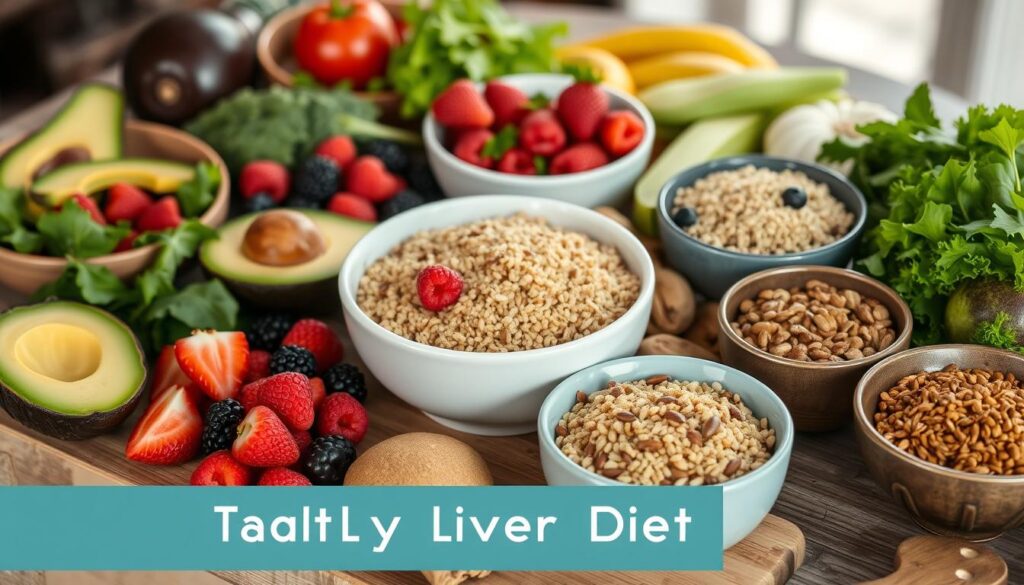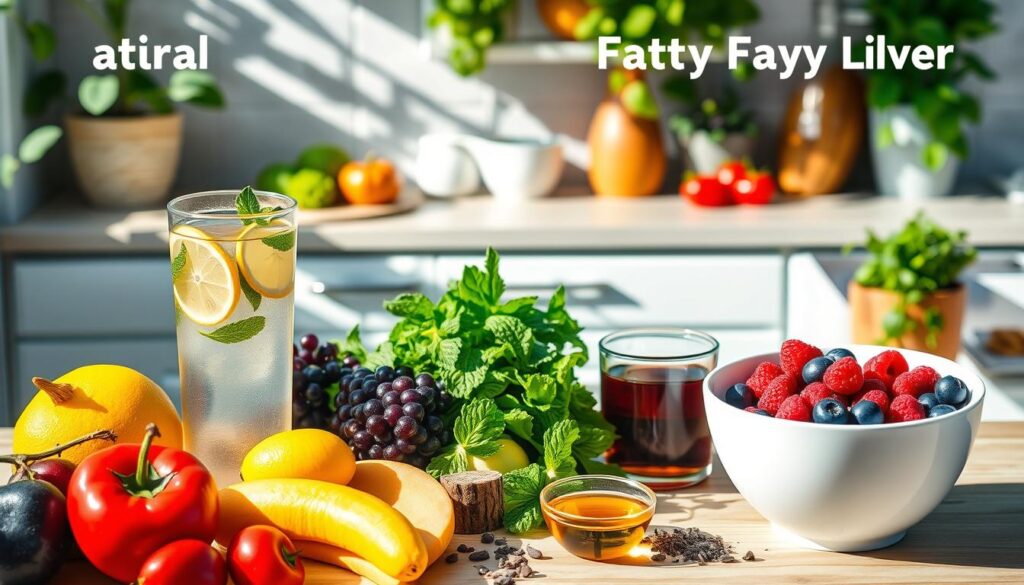Fatty liver disease is a common health concern that affects millions worldwide. While conventional medical treatments can be effective, many individuals are turning to natural, home-based remedies to manage this condition. In this comprehensive article, we will explore a range of natural treatment options that have shown promising results in addressing the root causes of fatty liver disease.
From dietary changes to holistic lifestyle adjustments, we will delve into the most effective natural approaches that can support liver health and promote overall well-being. Whether you’re seeking to prevent the development of fatty liver or looking to manage an existing condition, this guide will provide you with the knowledge and tools to take charge of your health through natural means.
Key Takeaways
- Explore the power of natural treatments and home remedies for managing fatty liver disease.
- Discover the importance of dietary modifications and the specific foods that can support liver function.
- Learn about the benefits of herbal supplements, such as turmeric and omega-3 fatty acids, in addressing fatty liver.
- Understand the role of hydration, exercise, and stress management in promoting liver health.
- Gain insights into the connection between sleep quality and liver recovery.
Understanding Fatty Liver Disease
Fatty liver disease, also known as hepatic steatosis, is a common condition where an excessive amount of fat accumulates in the liver. This buildup of fat can lead to inflammation and, ultimately, liver damage if left untreated. Understanding the nature of fatty liver disease is crucial for individuals seeking to improve their liver health through natural methods.
What is Fatty Liver Disease?
Fatty liver disease occurs when the liver is unable to metabolize and break down fatty acids effectively. This can happen due to a variety of factors, such as poor diet, obesity, and excessive alcohol consumption. The condition is often characterized by the presence of fat droplets within the liver cells, which can impair the organ’s normal functioning.
Causes of Fatty Liver
- Obesity and excess body weight
- Insulin resistance and type 2 diabetes
- High-fat, high-sugar diet
- Excessive alcohol consumption
- Certain medications and medical conditions
Symptoms to Watch For
In the early stages, fatty liver disease often presents with few or no noticeable symptoms. As the condition progresses, some individuals may experience:
- Fatigue and weakness
- Abdominal discomfort or pain
- Unexplained weight loss
- Jaundice (yellowing of the skin and eyes)
- Swelling in the legs or abdomen
It is important to note that the presence or absence of symptoms does not necessarily indicate the severity of the condition. Regular check-ups with a healthcare professional can help identify fatty liver disease and monitor its progression.
Dietary Changes for Liver Health
Adopting a nutritious, balanced diet is a crucial step in managing fatty liver disease and reducing its symptoms naturally. By carefully selecting the right foods, you can support your liver’s function and promote overall liver health.
Foods to Include
- Leafy green vegetables like spinach, kale, and arugula, which are rich in antioxidants and fiber
- Fatty fish such as salmon, mackerel, and sardines, which are high in anti-inflammatory omega-3 fatty acids
- Whole grains like quinoa, brown rice, and oats, which provide complex carbohydrates and fiber
- Nuts and seeds, including walnuts, almonds, and chia seeds, which are excellent sources of healthy fats
- Citrus fruits, berries, and other vibrant produce, which are packed with vitamins, minerals, and antioxidants
Foods to Avoid
- Processed and fried foods, which are high in unhealthy fats and can contribute to liver inflammation
- Added sugars, found in soda, baked goods, and candy, as they can increase fat accumulation in the liver
- Alcohol, which can directly damage liver cells and exacerbate fatty liver disease
- High-sodium foods like canned soups, deli meats, and snacks, as they can strain the liver’s ability to function
Importance of a Balanced Diet
Maintaining a balanced, nutrient-rich diet is essential for reducing fatty liver and promoting overall liver health. By incorporating a variety of wholesome foods and limiting the intake of processed, sugary, and high-fat items, you can support your liver’s natural detoxification processes and help reverse the effects of fatty liver disease. Consistency is key, so make dietary changes that you can sustain in the long run.

Natural Remedies for Fatty Liver
If you’re seeking natural ways to manage your fatty liver condition, there are several remedies worth exploring. From the ancient spice turmeric to the benefits of omega-3 fatty acids, these natural solutions can complement your overall treatment plan and support your liver’s health.
Turmeric and Its Benefits
Turmeric, the vibrant yellow spice commonly used in Indian cuisine, has gained attention for its potential to aid in fatty liver management. Curcumin, the active compound in turmeric, has been shown to possess anti-inflammatory and antioxidant properties that may help reduce liver fat accumulation and improve liver function. Incorporating turmeric-rich dishes or taking turmeric supplements can be a simple yet effective natural remedy for fatty liver.
The Role of Omega-3 Fatty Acids
Omega-3 fatty acids, found in foods like fatty fish, walnuts, and flaxseeds, have been extensively studied for their liver-supportive benefits. These essential fats can help reduce inflammation, improve insulin sensitivity, and even contribute to the reduction of liver fat. Supplementing with omega-3s or consuming omega-3-rich foods can be a valuable addition to your natural fatty liver treatment approach.
Herbal Supplements to Consider
- Milk thistle: This herb contains silymarin, a compound that may protect liver cells and promote regeneration.
- Artichoke leaf extract: Studies suggest that artichoke leaf extract can help lower cholesterol levels and improve liver function.
- Dandelion root: Dandelion root is believed to have detoxifying properties that may aid in the management of fatty liver disease.
While these natural remedies show promise, it’s important to consult with your healthcare provider before incorporating any supplements into your routine, especially if you are taking medication or have other underlying health conditions.
By exploring these natural remedies and making lifestyle changes, you can take an active role in managing your fatty liver and supporting your overall liver health.
The Power of Hydration
Staying well-hydrated is a simple yet powerful way to support your liver’s health and help reverse natural ways to reverse fatty liver. Water plays a crucial role in the liver’s ability to function optimally, flushing out toxins and facilitating essential metabolic processes.
How Water Supports Liver Function
The liver is responsible for over 500 vital functions in the body, and proper hydration is essential for many of these. Water helps the liver metabolize and eliminate harmful substances, reducing the strain on this vital organ. Adequate hydration also supports the liver’s role in regulating blood sugar levels and maintaining a healthy weight, two important factors in natural ways to reverse fatty liver.
Herbal Teas Beneficial for the Liver
- Milk Thistle: This herb is renowned for its ability to protect and regenerate liver cells, making it a popular choice for supporting liver health.
- Green Tea: Rich in antioxidants, green tea has been shown to help reduce inflammation and support the liver’s detoxification processes.
- Dandelion Root: Dandelion root tea is a diuretic, which can help the liver flush out toxins more efficiently.
Incorporating these herbal teas into your daily routine can be a simple and delicious way to support your liver and natural ways to reverse fatty liver. Staying hydrated and nourishing your body with liver-friendly herbs can go a long way in promoting overall liver health and wellness.

Exercise and Fatty Liver Management
For individuals struggling with fatty liver disease, regular exercise can be a powerful natural treatment. By incorporating the right types of physical activity into your routine, you can support liver health and promote overall well-being.
Recommended Types of Exercise
When it comes to managing fatty liver, a combination of aerobic exercise and strength training can be highly beneficial. Some of the best exercises to consider include:
- Brisk walking or jogging
- Swimming or cycling
- Resistance training with weights or resistance bands
- Yoga and Pilates, which combine flexibility and strength
These activities not only help to burn calories and improve cardiovascular fitness, but they also play a crucial role in reducing liver fat and improving insulin sensitivity.
The Importance of Consistency
When it comes to managing fatty liver exercises, consistency is key. Incorporating regular physical activity into your daily routine is essential for achieving long-term results. Aim to engage in at least 30 minutes of moderate-intensity exercise most days of the week to experience the full benefits for your natural treatment of fatty liver.
Remember, the journey to a healthier liver is a marathon, not a sprint. By making exercise a consistent part of your lifestyle, you can support your body’s natural healing processes and take a proactive approach to managing fatty liver disease.
Stress Management Techniques
Managing stress is crucial for maintaining a healthy liver. Prolonged stress can have a detrimental impact on the liver, leading to an increased risk of non-alcoholic fatty liver disease (NAFLD). By incorporating effective stress management techniques into your daily routine, you can support your liver’s overall wellbeing and promote natural treatments for NAFLD.
Mindfulness and Meditation Practices
Mindfulness and meditation are powerful tools for reducing stress and improving liver health. These practices can help you cultivate a greater sense of awareness, focus, and inner calm, which can have a direct positive impact on the liver. Engaging in regular mindfulness exercises, such as deep breathing, guided meditation, or body scans, can help alleviate the physical and mental effects of stress, ultimately supporting the natural treatments for non-alcoholic fatty liver disease.
The Impact of Stress on Liver Health
Chronic stress can have a significant impact on the liver’s function. Elevated stress levels can contribute to the development and progression of NAFLD by promoting inflammation, insulin resistance, and the accumulation of fat in the liver. By managing stress through various techniques, you can support the liver’s ability to regenerate and function optimally, enhancing the effectiveness of natural treatments for non-alcoholic fatty liver disease.
| Stress Management Techniques | Benefits for Liver Health |
|---|---|
| Mindfulness and Meditation | Reduces inflammation, improves insulin sensitivity, and supports liver regeneration |
| Regular Exercise | Improves blood flow, reduces fat accumulation, and enhances liver function |
| Adequate Sleep | Supports the liver’s detoxification processes and reduces inflammation |
| Balanced Nutrition | Provides the liver with essential nutrients to maintain optimal function |
By incorporating these stress management techniques into your lifestyle, you can support the natural treatments for non-alcoholic fatty liver disease and promote overall liver health.

“Stress is a silent killer, and its impact on the liver can be profound. By learning to manage stress effectively, you can unlock the liver’s incredible capacity for natural healing and resilience.”
The Role of Sleep in Liver Recovery
Achieving high-quality sleep is a crucial aspect of natural treatment for fatty liver disease. Adequate and restful sleep plays a pivotal role in supporting the liver’s recovery and overall health. By understanding the connection between sleep and liver function, individuals can adopt effective strategies to improve their sleep quality and, in turn, promote the healing of their fatty liver.
Tips for Better Sleep Quality
- Establish a consistent sleep schedule by going to bed and waking up at the same time each day, even on weekends.
- Create a sleep-conducive environment by keeping the bedroom cool, dark, and free from distractions like electronic devices.
- Engage in relaxing activities before bedtime, such as gentle stretching, meditation, or reading, to help your body transition into a restful state.
- Limit caffeine, alcohol, and heavy meals close to bedtime, as these can interfere with sleep quality.
- Consider incorporating natural sleep aids, like herbal teas or supplements containing melatonin, to support your body’s sleep-wake cycle.
Connection Between Sleep and Liver Health
Adequate sleep is directly linked to the liver’s ability to function optimally. During sleep, the liver undergoes important metabolic processes that aid in the breakdown and removal of toxins from the body. Disrupted sleep patterns can lead to an imbalance in liver enzyme levels, which can exacerbate fatty liver disease and impede the liver’s natural healing process. By prioritizing quality sleep, individuals with fatty liver disease can support their liver’s regenerative capabilities and improve their overall health outcomes.

| Sleep Quality | Impact on Liver Health |
|---|---|
| Adequate, Restful Sleep | Supports liver detoxification, enzyme balance, and regenerative processes |
| Disrupted Sleep Patterns | Can contribute to liver enzyme imbalances and impaired liver function |
By incorporating these sleep-promoting strategies and understanding the connection between sleep and liver health, individuals can take a proactive approach to supporting their liver’s recovery and overall well-being through natural fatty liver natural cure methods.
Monitoring Progress at Home
Embarking on a journey to improve your liver health through natural remedies can be an exciting and empowering experience. As you implement home remedies for fatty liver, it’s crucial to monitor your progress and stay vigilant for any changes in your symptoms or overall well-being.
Tracking Symptoms and Changes
Keep a journal to document your progress. Record any improvements or changes in the following areas:
- Abdominal discomfort or pain
- Fatigue and energy levels
- Digestive function and bowel movements
- Changes in appetite and food cravings
- Skin health and complexion
Regularly monitoring these key indicators can help you identify the effectiveness of your natural home remedies for fatty liver and make adjustments as needed.
When to Consult a Healthcare Professional
While natural remedies can be beneficial, it’s essential to work closely with your healthcare provider throughout your journey. Schedule regular check-ups to assess your progress and ensure your liver health is improving. Consult your doctor if you experience any of the following:
- Persistent or worsening symptoms
- Concerns about the effectiveness of your natural remedies
- Significant changes in your overall health or well-being
- The need for guidance on incorporating additional lifestyle changes
Your healthcare professional can provide valuable insights, monitor your condition, and help you navigate the path to a healthier liver.
| Symptom | Baseline | Week 2 | Week 4 | Week 6 |
|---|---|---|---|---|
| Abdominal Pain | 4 | 3 | 2 | 1 |
| Fatigue | 7 | 6 | 5 | 4 |
| Digestive Issues | 6 | 5 | 3 | 2 |
Embracing a holistic approach to home remedies for fatty liver can lead to remarkable improvements in your liver health. By closely monitoring your progress and collaborating with your healthcare provider, you can ensure that your natural treatment plan is effective and sustainable.

Conclusion: Embracing a Healthier Lifestyle
As you’ve discovered through this comprehensive guide, natural treatments for fatty liver can be highly effective in restoring liver health and well-being. By adopting a holistic approach that combines dietary changes, natural remedies, and lifestyle modifications, you can take proactive steps toward managing your condition and enjoying long-term benefits.
Long-term Benefits of Natural Treatments
Incorporating the natural remedies and lifestyle adjustments covered in this article can lead to a range of positive outcomes. From improved liver function and reduced fatty buildup to enhanced energy levels and overall better health, these natural approaches can help you reclaim control over your well-being. Persistent adherence to this regimen can yield remarkable results, empowering you to maintain a healthier liver and a more vibrant quality of life.
Encouragement for Positive Change
Remember, the journey toward a healthier liver is a gradual process, but the rewards are well worth the effort. By making sustainable changes to your diet, incorporating beneficial supplements like turmeric and omega-3s, and prioritizing stress management and exercise, you are taking proactive steps to support your liver’s natural healing abilities. Embrace this opportunity to enhance your overall health and well-being, and embark on a path of natural treatment of fatty liver and fatty liver natural cure. Your liver, and your entire body, will thank you for your dedication.